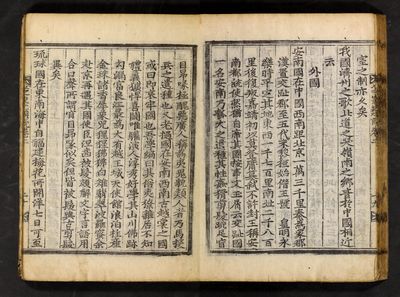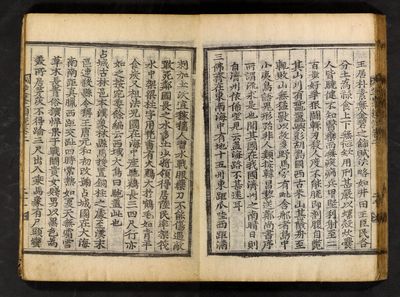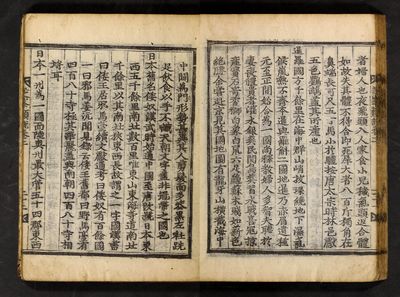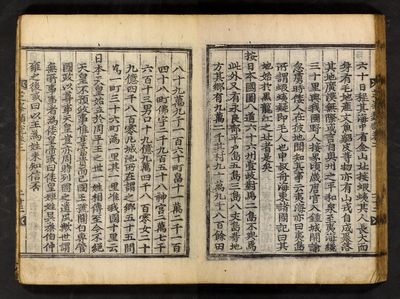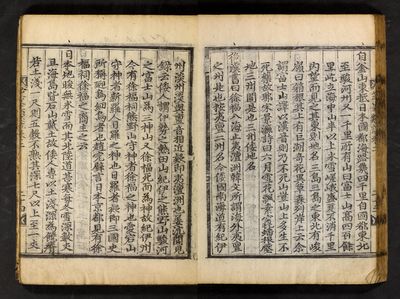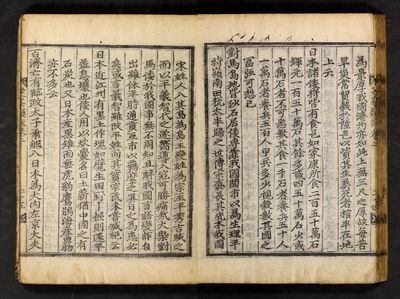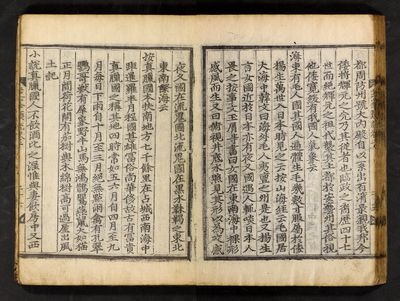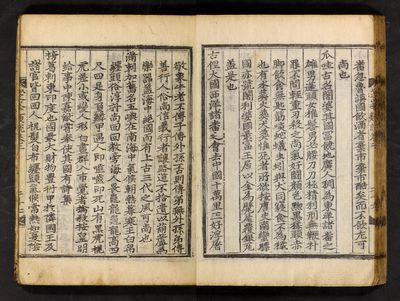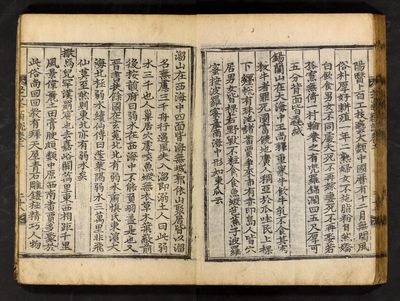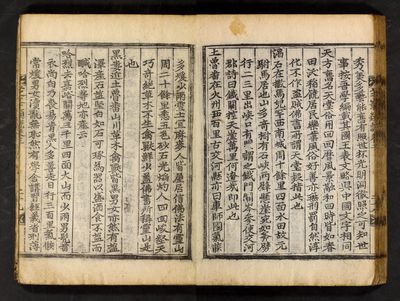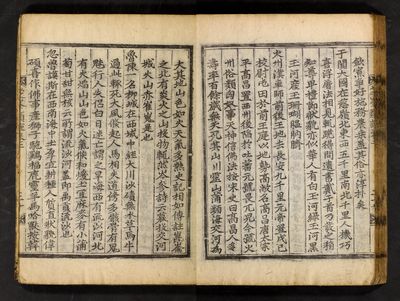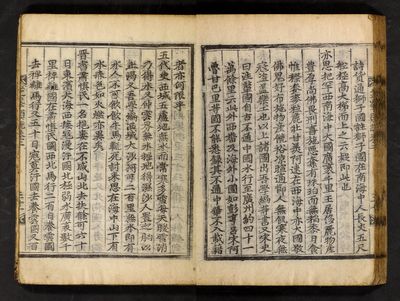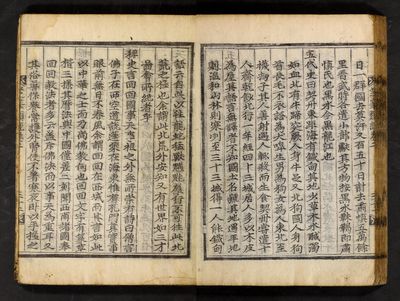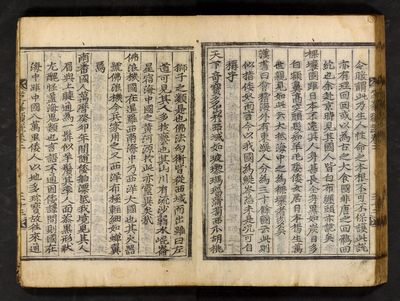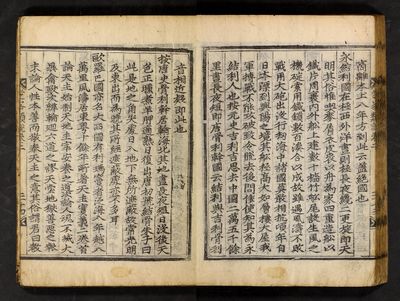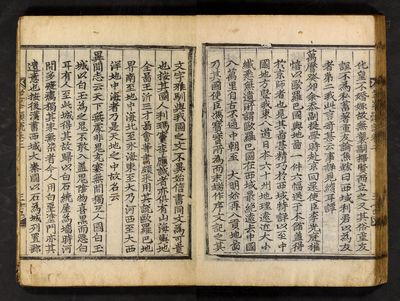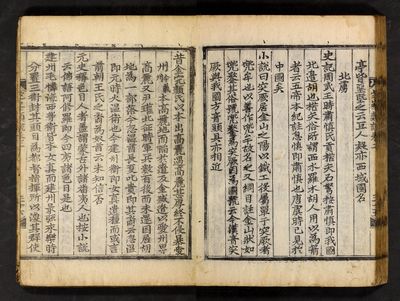(Translation) 李睟光 外國
| Primary Source | ||
|---|---|---|
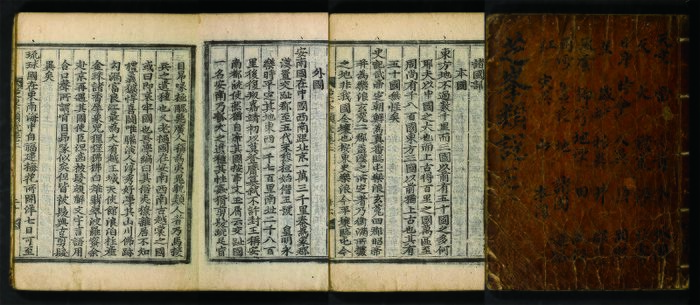 |
Title | |
| English | ||
| Chinese | 芝峯類說 | |
| Korean(RR) | 지봉유설(Jibongyuseol) | |
| Text Details | ||
| Genre | Royal Documents | |
| Type | ||
| Author(s) | 李睟光 | |
| Year | ||
| Source | ||
| Key Concepts | ||
| Translation Info | ||
| Translator(s) | Participants of 2018 Summer Hanmun Workshop (Advanced Translation Group) | |
| Editor(s) | ||
| Year | 2018 | |
목차
- 1 Introduction
- 2 Original Script
- 3 Discussion Questions
- 4 Further Readings
- 5 References
- 6 Translation
- 6.1 (sample) : Jaeyoon Song
- 6.2 Student 1 : (Write your name)
- 6.3 Student 2 : (Write your name)
- 6.4 Student 3 : (Write your name)
- 6.5 Student 4 : (Write your name)
- 6.6 Student 5 : (Write your name)
- 6.7 Student 6 : Kanghun Ahn
- 6.8 Student 7 : King Kwong Wong
- 6.9 Student 8 : Younès M'Ghari
- 6.10 Student 9 : (Write your name)
- 6.11 Student 10 : (Write your name)
- 6.12 Student 11 : (Write your name)
- 6.13 Student 12 : (Write your name)
- 6.14 Student 13 : (Write your name)
- 6.15 Student 14 : (Write your name)
Introduction
Original Script
Discussion Questions
Further Readings
References
Translation
(sample) : Jaeyoon Song
- Discussion Questions:
Student 1 : (Write your name)
- Discussion Questions:
Student 2 : (Write your name)
- Discussion Questions:
Student 3 : (Write your name)
- Discussion Questions:
Student 4 : (Write your name)
- Discussion Questions:
Student 5 : (Write your name)
- Discussion Questions:
Student 6 : Kanghun Ahn
- Translations:
24. 錫蘭山在大海中。王尚釋重象牛。飮牛乳不食其肉。殺牛者罪死。國富饒。地廣人稠。亞於爪哇。民上裸下纏帨。有珠池。諸番賈爭來市。有赤印島。人皆穴居。男女皆裸若野獸。不粒食。食魚蝦芭蕉子波羅蜜。按波羅蜜産南海中。形如東瓜云。
Ceylon (Sri Lanka) exists in the middle of the sea. Its kings venerate the Shakyamuni Buddha, and cherish elephants and cows. They drink milk, and do not eat beef. Those who kill cows are to be punished with execution. The country is opulent. Its land is vast, and has a large population, which is comparable to Java. They do not wear tops, and wind their bottoms with towels. There is a place where beads are abundant, so merchants there compete with each other, while forming a market nearby. There is an island called 赤人島, where people live in caves. Both men and women are naked like beasts. They do not eat grains. They instead eat fish, toads, plantains, and jackfruits. As for Jackfruits, they grow in the middle of the southern sea. It is said that they look like gourds.
25. 溜山在西海中。四面皆海。無城郭。依山聚居。皆以溜名。無慮三千。舟行遇風失入溜卽溺水三千巢居穴處。啖魚蝦. 無衣草木葉蔽前後。按韻府曰。弱水在西海中。不能負羽。蓋是也。又晉書。扶餘國在玄菟北。北有弱水。肅愼氏東濱大海。北極弱水。續仙傳曰。蓬萊隔弱水三萬里。非飛仙莫至。然則東北亦有弱水矣。
Liushan exists in the middle of the west sea. Its four sides are surrounded by the sea, so there are no fortifications. They gather and reside, relying on mountains. There are about three thousand places called “liu”. When boats encounter the wind, they lose their way, drift, and eventually sink. Its natives call it "three thousand lis of Ruoshui". People there make nests (and live there) or reside in caves, and eat fish and toads. They do not wear clothes, and cover their front and back with grass, trees and leaves. As I think about it, the book "Yunfu" states as follows: “Ruoshui exists in the middle of the west sea, and is not even capable of making a feather float.” So this is what it is. Also, the History of Jin says that the Puyo state is to the north of Xuantu. In the north, there was the Ruoshui, where the Sushen family reached all the way to the east of the great sea, and all the way to the north, which is the Ruoshui. The Xuxianzhuan (Sequel of the Biography of the Hermits) says that the Penglai blocks the way towards the three thousand lis of the Ruoshui, so one cannot get there, unless he is a flying hermit. Hence, there is also the Ruoshui to the northeast thereof.
26. 撒馬兒罕。漢罽賓也。去嘉峪關萬里。東西相距千里。風景偉麗。土田膏腴。頗類中原。西南番賈多聚於此。俗尚回回敎。有拜天屋。靑石雕鏤極精巧。人物秀美多藝能。舊有照世杯。光明洞徹。照之可知世事。按吾學編。載其國王表文。略與中國文字相同。
Samarkand was Kashmir during the Han period, and was a thousand lis apart from the Jiayu Guan. Its width (to the east and the west) is one thousand lis. Its scenery is vast and beautiful. Its land is fertile, which is pretty similar to the center of China. A lot of merchants of the Xinanpan gathered here. People are Muslims. They have their venues to venerate the heaven, which are decorated with blue stones in a very sophisticated fashion. Its people are superb, beautiful, and versatile. Back in the day, there was so-called Zhaoshibei, and its light was so vastly illuminating as to shine the whole world. As I think about it, the Wuxuebian contains the royal writings of its kings, and their letters seem to resemble those of China.
27.天方。舊名天堂。俗用回回曆。風景融和。四時皆如春。田沃稻饒。居民樂業。風俗好善。亦無刑罰。自然淳化。不作盜賊。佛書所謂天堂。疑指此也。
Tianfang used to be called Tiantang. Its people used the Islamic calender. It had a harmonious scenery. Its four seasons are like spring. Its land is fertile, and its grains are abundant. People there delightedly work. Its customs comply with virtues, so there were no punishments, and people were naturally cultivated. They did not commit burglary, so it seems (at least doubtedly) to be what the Buddhist texts call the heaven.
- Discussion Questions:
Student 7 : King Kwong Wong
- Translations:
25. 溜山在西海中。四面皆海。無城郭。依山聚居。皆以溜名。無慮三千。舟行遇風失入溜卽溺。土人曰此弱水三千也。人巢居穴處。啖魚蝦無衣。草木葉蔽前後。按韻府曰。弱水在西海中。不能負羽。蓋是也。又晉書。扶餘國在玄菟北。北有弱水。肅愼氏東濱大海。北極弱水。續仙傳曰。蓬萊隔弱水三萬里。非飛仙莫至。然則東北亦有弱水矣。
26. 撒馬兒罕。漢罽賓也。去嘉峪關萬里。東西相距千里。風景偉麗。土田膏腴。頗類中原。西南番賈多聚於此。俗尚回回敎。有拜天屋。靑石雕鏤極精巧。人物秀美多藝能。舊有照世杯。光明洞徹。照之可知世事。按吾學編。載其國王表文。略與中國文字相同。
27. 天方。舊名天堂。俗用回回曆。風景融和。四時皆如春。田沃稻饒。居民樂業。風俗好善。亦無刑罰。自然淳化。不作盜賊。佛書所謂天堂。疑指此也。
28. 渴石。在撒馬兒罕西南。城周十餘里。四面水田。故元駙馬居也。山多奇樹。有石峽。兩壁懸崖。宛如斧劈。行二三里。出峽口有門。謂之鐵門關。岑參使交河郡詩曰。鐵關控天崖。萬里何遼哉。卽此也。
- Discussion Questions:
Student 8 : Younès M'Ghari
- Translation (29-32):
29. 土魯番。在火州西百里。古交河縣。亦曰車師國。氣候多煖少雨雪。土宜麻麥。人皆屋居信佛法。有靈山周二十餘里。悉五色砂石。光焰灼火。四回峻壑。天巧奇絶。草木不生。禽獸鮮少。蓋佛書所稱靈山是也。
Turpan1 is 100 li away in the West from Huozhou2. It belongs to the ancient 틀:Jiaohe4. It is also called the Jushi Kingdom5. Its climate is very warm and it rains and snows only a little. The local products are sesame and wheat. People [there] all live in houses and believe in Buddhism. The area extends over more than 20 li. The whole five colors6 are sand and stones. The light flare, the fire burns. There are four deep gullies. The sky is incredibly wonderful.<sup7></sup> The grass and trees do not grow. The birds and beasts are very few. There are Buddhist scripts praising the spirits in the mountain.
30. 黑婁。近土魯番。山川草木禽獸皆黑。男女亦然。有鹽澤産石鹽。堅白如石。可琢爲器。以盛酒食。不鹽而鹹。哈烈等地亦産云。
Heilou8 is close to Turpan. The mountains, rivers, grass, trees, birds, beasts are all dark. Men and women are too.
31. 哈烈。去嘉峪關萬三千里。四面大山而少雨。男髡首。衣尚白。乃喪易靑黑。人多善走。日行三百里。氣候常煖。男女瀆亂無恥。然有學舍。講習經義。省刑薄"斂。寡爭好施。務農桑。蓋其俗亦淳朴矣。
32. 于闐大國。在葱嶺北。東西五千里。南北千里。人機巧。喜浮屠法。相見輒跪。得問遺書。戴于首乃發之。稍知尊卑禮節。狀貌亦似華人。有白玉河,綠玉河,黑玉河。産玉珊瑚膃肭臍。
1 土魯番: sinitic name of Turpan, a city located in modern Xinjiang, China, written as 吐鲁番 in Contemporary Mandarin Chinese (pinyin: Tǔlǔfān; Uyghur: تورپان).
2 火州: one of the designations of the city 高昌 (pinyin: Gāochāng; Uyghur: قاراغوجا) during the Yuan and Ming dynasties.
3 交河: 틀:One of the regions of China located at the East of Beijing.
4 縣: translating it 'county' as in Mandarin Chinese may pose the problem of its important size.
5 車師: the Jushi (pinyin: Jūshī), or Gushi (Mandarin: 姑師; pinyin: Gūshī), were a people who established a kingdom during the 1st millennium BCE in the Turpan basin.
6 五色: it can be metaphorically understood here as 'the environment' or 'the view'.
7 Interestingly, this passage looks familiar to the one of the 历代兴衰演义, written about a century later by Lǚ Fǔ (吕撫): "群山悉五色,砂石光焰灼人,峻壑穷崖,天巧奇绝。"
8 I could not find a place name that would correspond to this city today.
- Discussion Questions:
Student 9 : (Write your name)
- Discussion Questions:
Student 10 : (Write your name)
- Discussion Questions:
Student 11 : (Write your name)
- Discussion Questions:
Student 12 : (Write your name)
- Discussion Questions:
Student 13 : (Write your name)
- Discussion Questions:
Student 14 : (Write your name)
- Discussion Questions:
